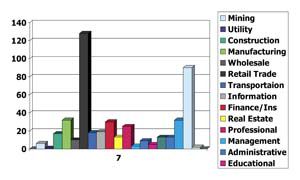County economic development director Delynn Fielding recently presented local boards and city councils with information regarding the business expansion and retention project.
The project main focus is to develop the local economy by focusing energy on retaining and expanding existing companies within the Castle Country area.
According to Fielding, the project has conducted more than 500 interviews with local businesses.
The interviews are aimed at developing the local economy in two separate stages. Information is taken from the local business visits and then entered into a highly advanced database. From there information is sent electronically to a specific member or members of the economic development community depending on the needs expressed by the business.
Once enough businesses or raw data has been entered, the Executive Pulse database has the capability to interpret very specific reports concerning a given areas economy.
“The trends shown within the database are showing us how to plan for the future of our local economy,” said Fielding.
Fielding reported that a significant number of Helper businesses reported have issues with marketing in their community.
“They wanted to know how we could help them get people off the highway,” explained Fielding.
To aid Carbon County businesses, Fielding along with BEAR team members, director Karl Kraync and David Cassidy from College of Eastern Utah developed, planned and hosted a three-part marketing seminar to incubate local skills.
Bbecause of the new data, Fielding indicated that the project’s next initiative will be to provide classes for those seeking additional capital for their business.
“We have had 108 companies report that they are short on capital,” explained Fielding.
Within the next month, BEAR plans to offer a preparation for capital access course to all local businesses. Fielding explained that, as information and specific needs are identified, BEAR personnel will continue to provide training and assistance.
The program’s June 1 findings report some very interesting facts about the local economy.
The average rate for 188 skilled/professional local employees is $16 per hour. All reported wage levels are below state and national averages. But the rates are perceived by local employers to be the “same as” or “greater than” the same averages, noted Fielding.
According to the databases finding’s, this may lead to additional problems with recruitment and retention in a tightening labor market nationally.
“There is a possibility that our tight job market is creating some changes in benefits for local employees,” commented Fielding.
Three hundred seventy of the companies or 74 percent of the whole reported offering no benefits to employees.
However, in 2006, 84 percent reported offering no benefits. The number has dropped to 59 percent in 2007.
The report demonstrated the importance of e-commerce in a global economy.
Of the 80 companies that reported little importance of the Internet to businesses, 66 posted less than 9 percent or declining sales growth.
Overall, the BEAR project is showing significant success, indicated Fielding.
The team has generated 240 referrals and closed 196.
The closures show that 196 local business owners reported problems and local economic development helped resolve the situations.
The projected value of the services is reported at more than $250,000, with a $165,000 estimated increase in revenue.
The team has also aided in the retention of eight jobs and the creation of 29 additional employment opportunities.
“The system and the project are working for the people of this community,” concluded Fielding.
Development director highlights business expansion report

Delynn Feilding
